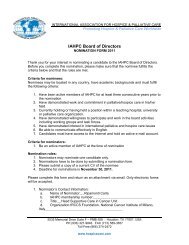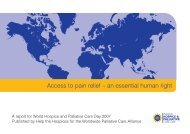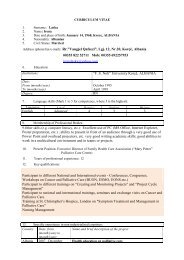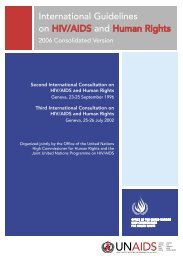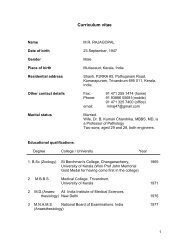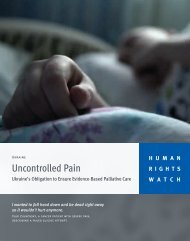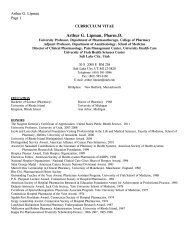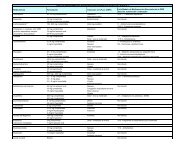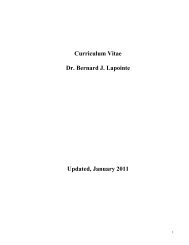INTERIGHTS Bulletin
INTERIGHTS Bulletin
INTERIGHTS Bulletin
Create successful ePaper yourself
Turn your PDF publications into a flip-book with our unique Google optimized e-Paper software.
178<br />
<strong>INTERIGHTS</strong> <strong>Bulletin</strong><br />
Volume 16 Number 4 2011<br />
International<br />
Law Reports<br />
occupation, it is responsible for its agents’ human rights<br />
violations.<br />
The Court held that: (1) the relatives of the applicants<br />
were subject to the jurisdiction of the UK because after<br />
the cessation of major combat operations in Iraq in May<br />
2003, the UK assumed authority over security operations<br />
in Basrah thereby establishing a jurisdictional link<br />
between those killed during British security operations<br />
and the UK under Article 1; (2) the fifth applicant has<br />
victim status, notwithstanding the applicant’s receipt of a<br />
substantial settlement for his civil claim and the<br />
admission of liability on behalf of the army, because<br />
there never was a thorough investigation into the<br />
applicant’s son’s death; (3) the UK violated Article 2 by<br />
conducting investigations into the deaths of the first to<br />
fifth applicants’ relatives that were insufficiently<br />
independent of the military chain of command; (4) the<br />
sixth applicant was no longer a victim of the procedural<br />
obligation under Article 2 due to the near completion of<br />
the public inquiry into the applicant’s son’s death; (5) the<br />
UK must pay each of the first five applicants EUR 17,000<br />
for non-pecuniary damage; (6) the UK must pay the first<br />
five applicants EUR 40,000 jointly in costs and<br />
expenses.<br />
LIFE; EQUALITY; REMEDIES<br />
Violation of Article II – right to equality before the law,<br />
Article I – right to life, liberty and personal security in<br />
conjunction with Article VII – right to protection for<br />
mothers and children and Article XVIII – right to fair<br />
trial – of the ADRDM<br />
Lenahan v United States<br />
Report no. 80/11, Case 12.626, Decision of the Inter-<br />
American Commission on Human Rights, 21 July 2011<br />
JL and SG were married but became estranged due to<br />
SG’s erratic and abusive behaviour. As a result of SG’s<br />
behaviour, JL obtained a restraining order restricting<br />
SG’s visitation with their three children. Subsequently,<br />
without informing JL, SG picked up his three daughters<br />
in his truck and drove away.<br />
JL, concerned that her children were missing, contacted<br />
the local police at 7:42 p.m. that day to request<br />
assistance. Over the next several hours, JL contacted the<br />
police department multiple times informing them that<br />
her daughters were missing, that they may be with SG<br />
and that she had a restraining order against SG. At<br />
approximately 3:25 a.m. the following morning, SG<br />
drove his pick-up truck to the police department and<br />
fired his pistol at the police station from the street. SG<br />
was killed during the ensuing exchange of gunfire with<br />
the police. When the police officers approached the truck<br />
following the shooting, they discovered the bodies of the<br />
three girls, each of whom who had been shot in the head.<br />
JL brought an action in the United States (U.S.) District<br />
Court based on the Due Process Clause of the<br />
Fourteenth Amendment to the U.S. Constitution. That<br />
case was appealed to the U.S. Supreme Court, which<br />
rejected JL’s claims. JL subsequently petitioned the<br />
IACHR.<br />
JL argued that the State failed to act with due diligence in<br />
protecting the lives of her daughters, in violation of their<br />
right to life guaranteed under Article I of the ADRDM. JL<br />
further argued that such failure was a result of<br />
discrimination based on their sex, in violation of Article<br />
II of the ADRDM. JL also asserted that her rights under<br />
Article XVIII of the ADRDM were violated in that she<br />
was unable to obtain a remedy for the non-enforcement<br />
of her protection order or a diligent investigation into the<br />
circumstances surrounding her daughters’ deaths,<br />
including SG’s ability to purchase a firearm and the<br />
inadequate response of the police. JL argued that these<br />
claims also implicated a violation of Articles IV and<br />
XXIV of the ADRDM.<br />
With respect to JL’s claims under Article I and Article II<br />
of the ADRDM, the State responded that the danger to<br />
JL’s daughters could not have been foreseen and,<br />
therefore, the State acted with reasonable diligence. With<br />
respect to JL’s claims under Article XVIII of the<br />
ADRDM, the State responded that this Article does not<br />
provide a right to a remedy related to non-enforcement<br />
of restraining orders, and that the State in fact undertook<br />
extensive investigations into the deaths of JL’s daughters.<br />
The Commission held that: (1) the State failed to act with<br />
due diligence to protect JL and her daughters from<br />
domestic violence, which violated the State’s obligation<br />
not to discriminate and to provide for equal protection<br />
before the law under Article II of the ADRDM; (2) the<br />
State failed to undertake reasonable measures to protect<br />
the life of the children in violation of their right to life<br />
under Article I of the ADRDM, in conjunction with their



